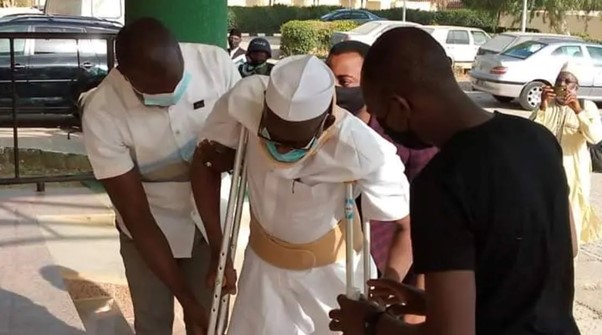Mahadi Shehu: Is Katsina Whistleblower’s Credibility At Stake?
Mahadi Shehu was taken to court on crutches, but was soon seen without them, and this has created a credibility question among critics.

In Feb. 2020, the Katsina State Government announced that Mahadi Shehu, a self-acclaimed whistleblower who accused it of fraud and embezzlement, would be dragged to court for alleged cybercrime.
The Kaduna-based political activist and businessman had claimed that the Katsina government squandered huge amounts in excess of ₦140 billion from security votes allocated between 2015 and 2020. He said he had documents to corroborate this claim.
He wrote several petitions to the Economic and Financial Crimes Commission (EFCC) and the Independent Corrupt Practices Commission (ICPC) inviting them to probe Katsina government officials.
Security votes, according to Matthew Page, consultant and co-author of Nigeria: What Everyone Needs to Know, are opaque corruption-prone funding mechanisms often misused by Nigerian officials at different levels of government.
The funds are exempted from oversight legislative audit, giving corrupt officials an opportunity to channel the money for personal use, instead of pressing security issues. Shehu accused the state government of using some amounts to pay bandits as ransom.
Denying the allegation, Katsina State Attorney General, Ahmad Usman El-Marzuq, told newsmen that they would not sit back, fold arms and watch the image of the government being sabotaged without taking legal action.
The government accused Shehu of forging documents to blackmail state officials but did not explain how.
“Investigations discovered that the allegations were unfounded, documents tendered were forged including the Governor’s signature and bank figures that were quoted were nonexistent,” El-Marzuq said.
Shehu was arrested in November and was ordered to be released in December last year after spending 11 days in detention. A High Court in Abuja ruled that his detention was unlawful, ordering the Nigeria Police to pay ₦5 million in damages.
On Feb. 16, he was re-arrested by police in Kaduna, and was transferred to Katsina where he was arraigned before a Federal High Court on March 1. The case was adjourned to Friday, March 12, and finally transferred to a Federal High Court in Kano.
The ‘quest for sympathy’
On Feb. 16, Shehu appeared before the court in a pathetic condition, feebly supporting his trembling body with the help of crutches. He wore neck and back braces and cried for support, accusing the Katsina state government of a plot to assassinate him.
“Is this how human beings are treated in Nigeria?” asked someone behind the camera in the footage.
The video sparked online outcry especially on Twitter and Facebook with several activists calling for his release. A hashtag #FreeMahadiShehu trended for more than 24 hours after the video of him puking in a courtroom surfaced on Twitter.
“What is happening to Mahadi Shehu affects us all. It is our monies that are being used to pay ransom and some are using it as an opportunity to inflate the amount and enrich themselves. His allegations should be investigated and not the state clamping on him,” Aisha Yesufu, a prominent political activist tweeted, promoting the hashtag #FreeMahadiShehu.
Another Twitter user with the name Boss Mustapha (@_yellows) rhetorically asked, “How can you illegally detain someone in such a condition? I’m scared of this country.”
A reply to the tweet by someone who claimed to be a frontline health worker with the username @Doctor_ML, said the act by Mahadi Shehu was staged.
“I am a frontline health worker, and when I see a stage play, I know one… I saw a lot of points from this video that hints to that!!” he said.
The allegation turned out to be true as another video later released showed Shehu initially supported by crutches as he came out of what appeared to be a toilet in his detention room. He then threw the crutches away and performed prayers, bowing, and prostrating without support.
HumAngle sources confirmed the video was genuine and was recorded to show how Shehu lied about his health condition to secure a bail.
Daily Trust columnist Gimba Kakanda wrote a piece on the saga detailing how Mahadi disappointed him after he defended his honour and opposed his critics.
“The video formatted my perception of the man,” Kakanda wrote. “But the bigger picture isn’t that we were tricked into imagining a health crisis that never happened, it was the fact that such theatrics are necessary to attract justice in the court.”
“But we don’t know exactly why Mahdi Shehu adopted this tactic to seek public sympathy and tempt benign sentence, even though two explanations are plausible: One, having been granted bail twice and refused by the police, it’s likely that he faked this deteriorated or exaggerated health state to draw attention and sympathy to his seemingly overlooked witch-hunt.”
“The second explanation is one I fear: the possibility that his revelation of Governor Masari’s corruption, or his activism itself, is built on falsehood and half-truths.”
A High Court in Kano granted Shehu bail of ₦10 million with the added requirement of one surety in like sum. The court said the surety must be a resident of Kano who has a traceable landed property. The presiding judge, Ambrose Allagoa, ordered the accused remanded in the custody of the Nigeria Correctional Service pending fulfilment of his bail conditions.
Support Our Journalism
There are millions of ordinary people affected by conflict in Africa whose stories are missing in the mainstream media. HumAngle is determined to tell those challenging and under-reported stories, hoping that the people impacted by these conflicts will find the safety and security they deserve.
To ensure that we continue to provide public service coverage, we have a small favour to ask you. We want you to be part of our journalistic endeavour by contributing a token to us.
Your donation will further promote a robust, free, and independent media.
Donate HereStay Closer To The Stories That Matter




